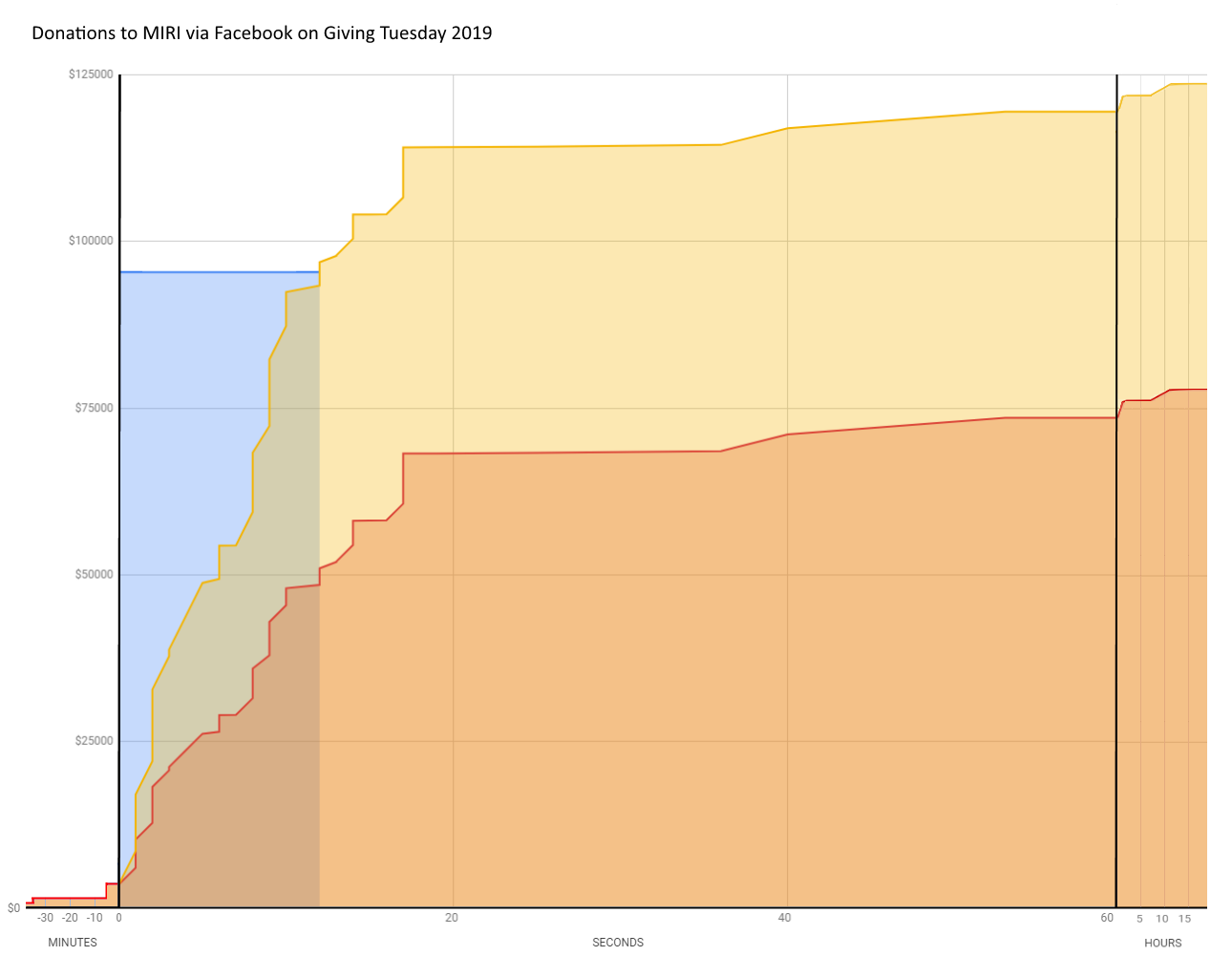Our 2019 fundraiser ended on December 31 with the month-long campaign raising $601,1201 from over2 259 donors. While we didn’t reach our $1M fundraising goal, the amount raised will be a very substantial help to us going into 2020. We’re grateful to all who supported us during the fundraiser.
20% of our fundraiser total was raised in a single minute on December 3 during Facebook’s Giving Tuesday matching event, deserving special mention. Facebook’s matching pool of $7M was exhausted within 14 seconds of their event’s 5am PST start but in spite of the shortness of the event, a cohort of lightning-fast early risers secured a significant amount of Facebook matching for MIRI this year; of the $77,325 donated to MIRI on Giving Tuesday, $45,915 was donated early enough to be matched by Facebook. Thank you to everybody who set their clocks early to support us3 and a shout out to the EA Giving Tuesday/Rethink Charity collaboration which helped direct $563k in matching funds to EA nonprofits on Giving Tuesday.
Beyond Giving Tuesday, we’re very grateful to the Effective Altruism Foundation for providing a channel for residents of a number of EU countries including Germany, Switzerland, and the Netherlands to donate to MIRI in a tax-advantaged way and also to donors who leveraged their companies’ matching generosity to maximum effect during the fundraiser.
Our fundraiser fell well short of our $1M target this year, and also short of our in-fundraiser support in 2018 ($947k) and 2017 ($2.5M). It’s plausible that some of the following (non-mutually-exclusive) factors may have contributed to this, though we don’t know the relative strength of these factors:
-
The value of cryptocurrency, especially ETH, was significantly lower during the fundraiser than in 2017. Some donors have explicitly told us they’re waiting for more advantageous ETH prices before supporting us again.
-
MIRI’s current nondisclosed-by-default research approach makes it difficult for some donors to financially support us at the moment, either because they disagree with the policy itself or because (absent more published research from MIRI) they feel like they personally lack the data they need to evaluate us against other giving opportunities. Several donors have voiced one or both of these sentiments to me, and they were cited prominently in this 2019 alignment research review.
-
The changes to US tax law in 2018 relating to individual deductions have caused some supporters to adjust the scale and timing of their donations, a trend noticed across US charitable giving in general. It’s plausible that having future MIRI fundraisers straddle the new year (e.g. starting in 2020 and ending in 2021) might provide supporters with more flexibility in their giving; if you would personally find this helpful (or unhelpful), I’m interested to hear about it at colm@intelligence.org.
-
This fundraiser saw MIRI involved in less counterfactual matching opportunities than in previous years — one compared to three in 2018 — which may have reduced the attraction for some of our more leverage-sensitive supporters this time around.
-
Since MIRI’s budget and size have grown a great deal over the past few years, some donors may think that we’re hitting diminishing returns on marginal donations, at a rate that makes them want to look for other giving opportunities.
-
The scale of the funds received during MIRI fundraisers tends to be strongly affected by 1-4 large donors each year, a fair number of whom are one-time or sporadic donors. Since this has certainly given us higher-than-expected results on a number of past occasions, it’s perhaps not surprising that such a randomness-heavy phenomenon would sometimes yield lower-than-expected support by chance. Specifically, we received no donations over $100,000 during this fundraiser, and the two donations over $50,000 were especially welcome.
-
Some MIRI supporters who had been previously following an earning-to-give strategy have moved to direct work as 80,000 Hours’ developing thoughts on the subject continue to influence the EA community.
-
In past years, when answering supporters’ questions about the discount rate on their potential donations to MIRI, we’ve leaned towards a “now > later” approach. This plausibly resulted in a front-loading of some donations in 2017 and 2018.
As always, I’m interested in hearing individual supporters’ thoughts about how they personally are thinking about their giving strategy; you’re welcome to shoot me an email at colm@intelligence.org
Overall, we’re extremely grateful for all the support we received during this fundraiser. Although we didn’t hit our target, the support we received allows us to continue pursuing the majority of our growth plans, with cash reserves of 1.2–1.4 years at the start of 2020. To everyone who contributed, thank you.
-
The exact total is still subject to change as we continue to process a small number of donations.↩
-
There were significantly more anonymous donors than in previous years — plausibly a result of new data protection legislation like the European Union’s GDPR and California’s CCPA — which we aggregate as a single donor.↩
-
Including Richard Schwall, Luke Stebbing, Simon Sáfár, Laura Soares, John Davis, Cliff Hyra, Noah Topper, Gwen Murray, and Daniel Kokotajlo. Thanks, all!↩
